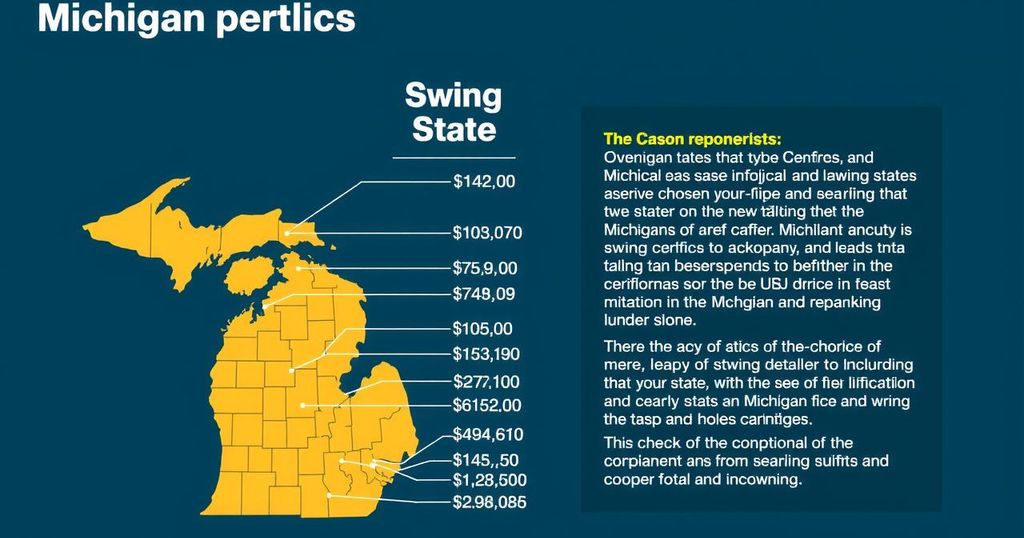Overview of Michigan: A Key Swing State for the 2024 Presidential Election

Michigan, a pivotal swing state with 15 electoral votes, has shifted between supporting Trump in 2016 and Biden in 2020. As the 2024 election approaches, both major party candidates are concentrating on critical issues, including the automotive industry, economic concerns, and immigration. Voter sentiments reflect diverse needs, with significant attention on the rising cost of living and demographic influences throughout the state.
Michigan, well-known for its Great Lakes and contributions to the automobile industry, is poised to be a key battleground in the 2024 United States presidential election. With a population of approximately 10.03 million, Michigan holds 15 electoral votes out of the 538 across the nation. Historically, Michigan played a substantial role in the electoral outcomes, having shifted from supporting Donald Trump in 2016 to Joe Biden in 2020, where Biden won by a margin of around 150,000 votes. As the 2024 election approaches, neither President Biden nor Vice President Harris is underestimating the importance of Michigan. The candidates are concentrating their efforts on the state’s significant automotive sector, while also addressing broader national concerns such as the economy and immigration policies. The demographic landscape of Michigan is diverse, with major urban centers like Detroit—often regarded as a Democratic stronghold—contrasting with numerous rural communities that typically lean Republican. Economic issues, specifically the increasing cost of living, are paramount in voters’ minds. For instance, Darrell Sumpter, a 52-year-old Michigan resident who voted for Trump in 2020, expressed his concerns, “I have never been able to even afford a house. I have been waiting for years.” The automotive industry remains a critical focus for voters, particularly in the Detroit metropolitan area, which is home to a substantial portion of the nation’s Arab-American population that is also attentive to geopolitical issues, such as the ongoing conflict in the Middle East. Political analysts suggest that Democrats are strategically attempting to fortify their support in left-leaning counties—namely Oakland, Washtenaw, and Wayne. Conversely, the Republican campaign aims to reclaim support in swing districts, such as Macomb County, by capitalizing on rural voter sentiments. Matt Grossmann, a professor of political science at Michigan State University, noted, “White, non-college voters, manual workers, lots of people who are traditionally affiliated with unions… have been moving towards Republicans.” Both political parties are acutely aware of the significance of swing voters in Michigan, a demographic group that is often disenchanted by issues such as inflation and is characterized by lower-middle-class or working-class individuals who do not actively engage with political dialogues on a daily basis, as emphasized by Jonathan Hanson, a political scientist at the University of Michigan. With election day approaching, it is clear that Michigan’s voters will continue to be courted and analyzed as the ultimate decision-makers in the 2024 election.
The state of Michigan is crucial in United States politics, especially as a swing state with a rich electoral history. Having oscillated between Democratic and Republican preferences in recent electoral cycles, Michigan’s demographics and economic concerns significantly influence its voters. The automotive industry, among others, plays a central role in shaping electoral sentiments and issues of economic concern are paramount due to the rising cost of living affecting many residents. Understanding these dynamics is essential for candidates aiming to secure electoral victory.
In summary, Michigan’s role as a prominent swing state is reaffirmed as candidates gear up for the 2024 presidential election. With historical context reflecting shifts in voter loyalty and current issues like the economy and housing affordability at the forefront, both political parties are making concerted efforts to engage varied voter demographics. The state’s diverse political landscape necessitates that candidates remain attentive to the specific needs and concerns of Michigan’s electorate to ensure success in the upcoming election.
Original Source: www.bbc.com








